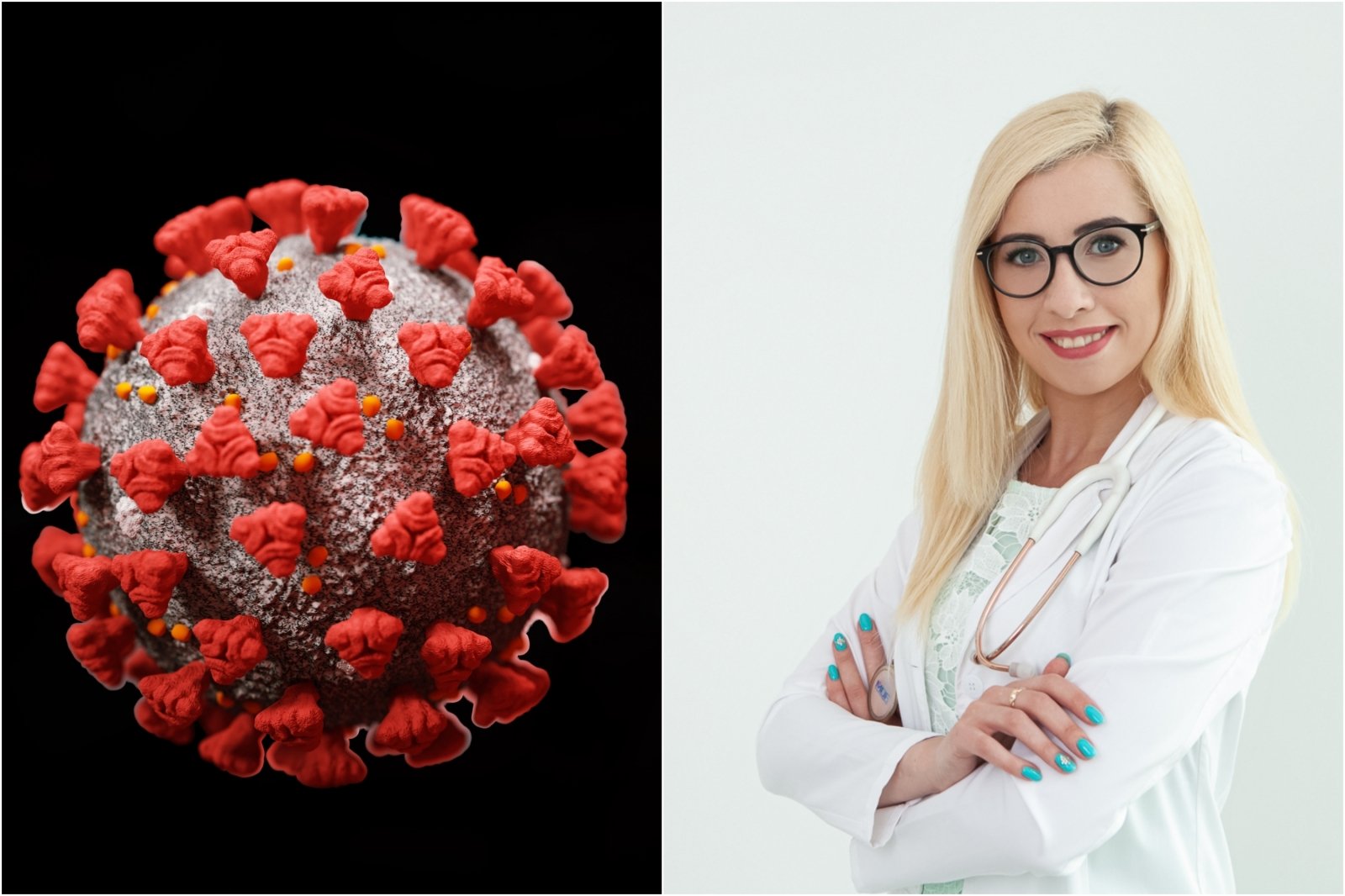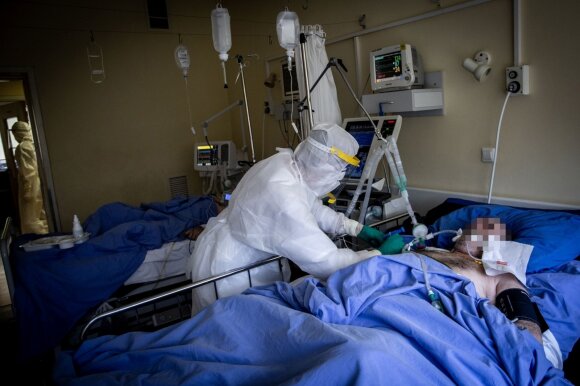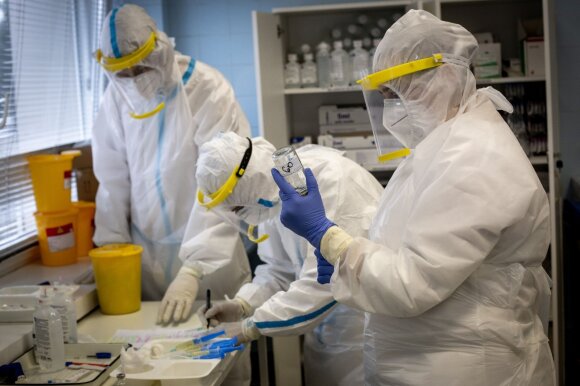
[ad_1]
The family doctor assures that in the face of any form of coronavirus, more intensive care of the body is necessary – and advises what steps to follow to return to the previous rhythm of life as soon as possible.
Serious complications can occur with COVID-19
Kristina Lebedevaitė, a family doctor at the Endemik medical clinic of the Affidea group of companies, explains in a press release that a coronavirus infection can manifest itself in various ways. For those who do not feel symptoms, vigilance and isolation for 10 days is usually sufficient.
Patients with a mild form of the disease: uncomplicated upper respiratory tract infection with specific COVID-19 symptoms such as fever, cough, sore throat, headache, muscle aches, general weakness, nausea, vomiting, diarrhea, and loss of smell and taste. Adults with moderate illness are diagnosed with pneumonia, children with a cough, fever, shortness of breath, and increased breathing.
Severe COVID-19 patients develop severe pneumonia with supplemental oxygen needs and the critical condition is sepsis, septic shock, acute respiratory distress syndrome, or multiple organ dysfunction syndrome.
During these conditions, due to the predominant inflammatory response to infection, various organs are damaged: blood circulation is disrupted and acute respiratory failure develops.
“When you are sick, mild signs may predominate at first, but for a variety of reasons, the condition can get complicated and progress to critically severe. Strong inflammatory processes in the body can lead to failure of various organs, such as the liver or kidneys.
In addition, due to the systemic inflammatory response, thromboembolic complications of various sites often develop, the clinical manifestations of which can be myocardial infarction, stroke, pulmonary embolism. Heart failure and arrhythmia can also develop.
These diseases can occur during an active disease both in patients treated at home and in those whose condition is controlled in a hospital, ”explains K. Lebedevaitė.
Residual phenomena, even for those with a mild form of the disease.
The GP says that after a coronavirus, some disorders or injuries can persist for several more months, as well as a risk of residual phenomena that may need to be addressed throughout life. K. Lebedevaitė reveals that the frequency of late complications may depend on the severity of the disease, but even in patients with a mild form of the disease, unpleasant health disorders can occur.

© Vidmantas Balkūnas
“Even in the case of a moderate form of the disease, often even after a few months, the heart muscle and other injuries can be detected, increasing the risk of developing heart failure in the future. Decreased respiratory function is observed in patients with COVID-19-induced pneumonia, even one month after illness.
If the pneumonia was massive, the affected areas progress to connective tissue, where scar lesions form and pulmonary fibrosis develops as a late complication. The chronic disease of the patient lasts a lifetime and can only progress as it progresses, ”says the doctor.
He also points out that up to 60 percent. Fatigue and dyspnea can occur up to 4 to 8 weeks after recovery, one of the most common residual events reported by patients, even in those with mild coronavirus.
“Even with a mild form of COVID-19, systemic inflammation can also lead to peripheral nerve damage, also known as Guillain-Barré syndrome. Also, the risk of developing Parkinson’s and Alzheimer’s diseases may increase in the future, ”says K. Lebedevaitė.
The doctor assures that even 3 months after the confirmation of the diagnosis, neurological disorders such as anxiety, depression, changes in taste and smell, headache, muscle aches, visual and hearing deficiencies, weakness of the limbs, tremors can be detected in the hands, memory, cognitive function. disorders, mood swings. According to the GP, these ailments are more common in patients under 60 years of age.
If you become infected with coronavirus, you should consult a specialist
Family doctor K. Lebedevaitė ensures that all COVID-19 patients, regardless of well-being and residual symptoms, are recommended to visit a family doctor to assess and examine their general condition.
“Regardless of the patient’s symptoms, it is necessary to assess his cardiovascular system by measuring blood pressure, monitoring heart rate and monitoring the electrocardiogram to detect arrhythmias and conduction abnormalities.
If changes are found, it is necessary to consult a cardiologist, perform an ultrasound examination of the heart, determine the amount of troponin I. If you notice unusual indicators in these tests, perform other instrumental tests, such as cardiac MRI or Holter monitoring ” , the doctor talks about possible heart disorders.

The coronavirus affects memory
© Montage by DELFI / Shutterstock
It also mentions that due to the perception of respiratory dysfunction, it is important to perform detailed spirometry examinations, perform a chest X-ray to detect residual focal changes, and consult a pulmonologist for deviations if a deviation is found.
According to K. Lebedevaitė, in case of coronavirus, it is advisable to take a closer look at your immunity to the disease and carry out antibody tests. It is also necessary to assess the electrolyte and glycemic parameters of the patient due to metabolic disorders, assess liver and kidney function, the risk of thrombosis, review the rates of bacterial infections, investigate inflammatory changes.
Each patient experiences this complex disease differently, so it is natural that well-being after the disease is also individual, so it is recommended to consult a specialist for the most appropriate examination for each person.
“Our clinics provide 3 levels of ‘postcovidial’ testing for relapsed COVID-19 infection, each tailored to a variety of patient complaints about declining health, and test results are analyzed by a team of professionals, “says the family doctor.
She says a basic screening program is recommended for anyone with coronavirus, regardless of the symptoms they experience. This test assesses possible inflammatory processes in the body, changes in the liver and kidneys, and determines immunity to the virus.
The moderate program is offered to those patients who, even after recovery, experience health problems: shortness of breath, cough, chest pain or headache, monitor changes in blood pressure. This test also helps identify heart changes.
The third program, comprehensive, according to the doctor, covers all the aforementioned health problems and helps to investigate the most common complications. The program assesses lung and heart function, neurological disorders, and mental health. These tests are recommended for those who have been hospitalized for a coronavirus infection and have had serious complications.
How to return to a normal rhythm of life?
K. Lebedevaitė ensures that most bodily injuries caused by coronavirus infection clear up on their own within a certain period of time or by providing additional rehabilitation measures. However, more serious diseases can cause such residual effects that they will affect the body irreversibly.

© Vidmantas Balkūnas
“To return to a normal rhythm of life more quickly in the event of COVID-19, it is recommended that immediate visits to the GP be made, as it will be investigated thoroughly to determine what new testing tactics are necessary and refer other professionals to avoid serious complications. ” explains the doctor.
He adds that to maintain a good general state of the body, various rehabilitation procedures, exercises, sports exercises that can be performed both in health institutions and on your own at home are advisable. K. Lebedevaitė ensures that this decision will improve well-being and help to gradually increase the capacity for physical activity and return to the previous normal rhythm of life over time.
It is strictly prohibited to use the information published by DELFI on other websites, in the media or elsewhere, or to distribute our material in any way without consent, and if consent has been obtained, it is necessary to indicate DELFI as the source. .
[ad_2]